#Dmitry Utkin
Explore tagged Tumblr posts
Text
Wagner Mercenary Group Boss Yevgeny Prigozhin Dead
A Private jet carrying Russian mercenary chief Yevgeny Prigozhin has crashed with 10 people on board.
In addition to Prigozhin, neo-Nazi Wagner leader Dmitry Utkin was allegedly aboard on the plane and is now dead.
“Wagner-linked Telegram channel Grey Zone reported the Embraer aircraft was shot down by air defense in the Tver region, north of Moscow,” BBC reported.
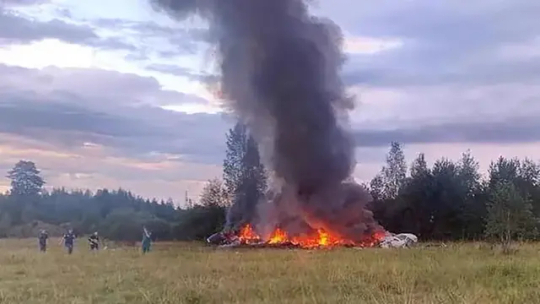
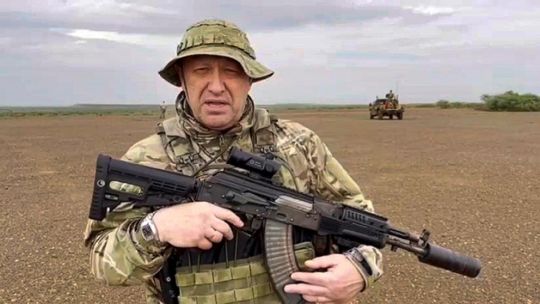
#wagner group#Yevgeny Prigozhin#Dmitry Utkin#Wagner Mercenary Group Boss Yevgeny Prigozhin Dead#russia#russian war on ukraine#jet shot down#plane shot down#war#world at war
72 notes
·
View notes
Text
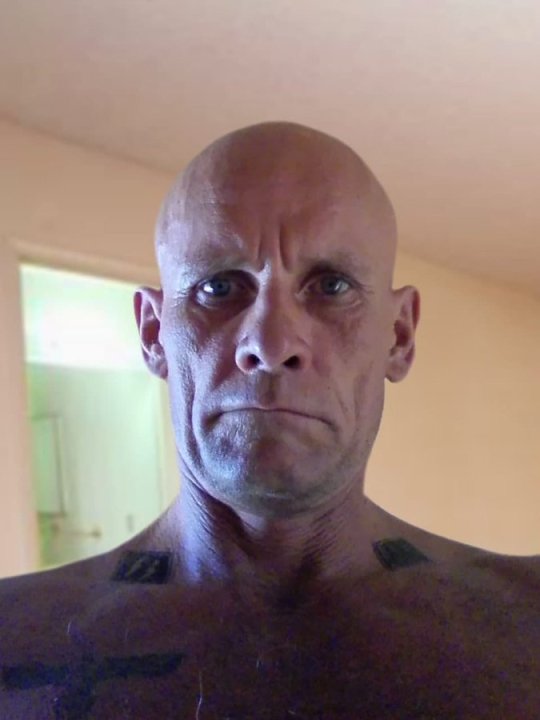
It's funny how those Russians always look like movie villains. Throw in a scar or a swastika and your character development is done. This is not the Method-acting crowd...
#utkin#Dmitry utkin#wagner#wagner pmc#wagner chief#prigozhin#yevgeny prigozhin#vladimir putin#putin#vladimir#russia#russian#russians
3 notes
·
View notes
Text
Muertes Oportunas
La muerte del mercenario mayor de estos tiempos, Yevgueni Prigozhin, ex jefe del Grupo Wagner y su lugarteniente Dmitri Utkin, quienes sirvieran fielmente al ex coronel Vladimir Putin, en muchas de sus tropelías, hasta que quisieron morder al amo, sitúa en primer plano a los numerosos rivales del antiguo oficial de la KGB cuyas defunciones están envueltas en el misterio, tal y como ha pasado en…
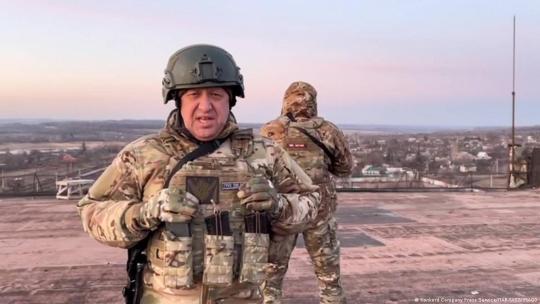
View On WordPress
#Ex Coronel Vladimir Putin#ex jefe del grupo Wagner#La columna de Pedro Corzo#Lugarteniente Dmitri Utkin#Muertes oportunas#Prigozhin
0 notes
Text
"Fucking fascist, bitch!" 87-year-old pensioner beaten in central Moscow for negative remarks about Wagner PMC. He is a victim of the Great Terror of 1937 On a bus passing Lubyanka in Moscow, two people attacked 87-year-old pensioner Dmitry Grinchiy, OVD-Info writes , citing eyewitnesses and lawyer Oskar Cherdzhiev. When the bus passed the memorial to Yevgeny Prigozhin and Dmitry (Wagner) Utkin on Varvarka, Grinchiy allegedly called the PMC mercenaries murderers. Two mature men began to insult 87-year-old Grinchiy, attacked him, twisted his arms and forcibly dragged him out of the transport. "Get out, bitch! You fucking fascist, bitch!" — the attacker shouts at the elderly man. He was handed over to the traffic police officer on duty. The police detained both Grinchiy and the attackers. The pensioner was taken to the Kitay-Gorod police department, and then to the Basmanny police department. The attackers filed a complaint against him, but the police released the elderly man. Dmitry Grinchiy was born in 1937, but learned his last name only at the age of 15. His father, Pavel Grinchiy, head of the Civil Air Fleet's planning department, was executed in 1938 on charges of spying for Japan; he was rehabilitated in 1966.
4 notes
·
View notes
Text
The investigative outlet Agentstvo has identified a number of former Wagner Group commanders who signed military contracts with the Russian Defense Ministry and are now part of Wagner Legion Istra — a battalion established about a year ago.
The Wagner Legion recruits fighters through the military enlistment office in Istra, a town in the Moscow region, and with the help of local authorities. In March 2024, Istra Mayor Tatyana Vitusheva reported that more than a thousand “Wagnerites” had joined the group.
Agentstvo managed to identify the former Wagner mercenaries after they appeared in a 40-minute interview with 360, a government television channel covering the Moscow region. Only one of them used his real name in the interview — the former commander of the Wagner Group’s 1st Assault Detachment, Alexander Kuznetsov (call sign, “Ratibor”). Four others used their call signs or positions within the Wagner Group or the Legion.
Russia officially disbanded the Wagner Group after its founder, Yevgeny Prigozhin, died in a plane crash in August 2023 — exactly two months after he led a short-lived rebellion against the country’s military brass. In the interview with 360, Kuznetsov said that Prigozhin’s death “was a shock.”
“When our leader disappeared, we had no desire to work under anyone else’s leadership, because no one could’ve formed this unique structure the way Yevgeny Prigozhin and Dmitry Utkin did,” he said, referring to a prominent Wagner Group commander also killed in the plane crash.
According to Kuznetsov, many Wagner Group fighters “started to leave, transfer, [or] sign contracts with the Defense Ministry” after Prigozhin and Utkin died. These mercenaries, he claimed, mainly joined airborne and infantry units, and continued “to carry out combat missions.” Another former Wagner commander, who used the call sign “Marx,” told 360 that “around 53,000 people or so” passed through the mercenary group.
Agentstvo identified “Marx” as Igor Sukhodolsky, a 55-year-old from Saratov who joined the Wagner Group shortly after its founding in 2013–2014, and went on to become its chief of staff. Sukhodolsky was awarded the Order of Courage for his involvement in the battle of Bakhmut and he also claims to have received state decorations for other operations in Syria, Libya, the Central African Republic (CAR), and Ukraine.
Agentstvo identified the three other mercenaries in the interview as Ruslan Chlalyan, Andrey Ivanov, and Ruslan Zaprudsky.
Chlalyan, call sign “Radimir,” is a 47-year-old from Sochi and the former deputy commander of the Wagner Group’s 1st Assault Detachment. According to the Myrotvorets database, Chlalyan took part in Wagner operations in Sudan in 2019 and received a 4th class Order For Merit to the Fatherland for his participation in the battle of Bakhmut.
Ivanov, call sign “Kep,” is a 41-year-old from Krasnodar Krai and the former commander of the Wagner Group’s 2nd Assault Detachment. Ivanov told 360 he joined the mercenary cartel in 2014 as a machine gunner, and later received state awards — including the title Hero of Russia — for fighting in Syria, Libya, the CAR, and Mali. He is currently under U.S. sanctions for acting as a mediator in the Wagner Group’s negotiations with the Malian authorities over arms supplies and mineral extraction.
Zaprudsky, call sign “Rusich,” is a 43-year-old from Azov (a town in Russia’s Rostov region) and the former commander of the Wagner Group’s 13th Assault Detachment. From March 2016 to December 2022, he was registered as an entrepreneur. According to the Myrotvorets database, he received a 4th class Order For Merit to the Fatherland after fighting for Wagner in Bakhmut and was also awarded the Order of Courage.
The 360 interview revealed that “Radimir” oversees the Wagner Legion’s operations in Libya, while “Kep” oversees operations in Mali and “Rusich” commands a detachment in Ukraine. “Istra is one of [those] unique places that gave our guys who were in the Wagner PMC the opportunity to sign a contract with their Motherland, with the Defense Ministry,” Kuznetsov said in the interview. “They’re all still Wagner at heart. And now they’re all going in different directions: some to the Africa Corps, others to the SVO.”
“Guys who know [Rusich], Radimir, and Kep are already flocking and ready [to join up], because they know them as combatant commanders, competent ones, […] and have confidence in them,” he added.
Agentstvo described the interview with the former mercenaries as “highly unusual” and deemed it a PR stunt. Pro-Kremlin war bloggers have also begun to promote the Wagner Legion, with Alexander Kots sharing a recruitment ad with his 590,000 Telegram subscribers and Alexander Sladkov pushing the 360 interview to his 888,000 followers.
4 notes
·
View notes
Text
so prigozhin has met his completely foreseeable end and lets talk some of the ramifications.
firstly the plane had not only priggy boy but a good chunk of senior wagner leadership including dmitri utkin, the avowed neo nazi, who was in charge of wagner combat operations including the push for moscow. apparently putting all your eggs in one basket allowing for an easy decapitation strike is a good idea.
as for the company itself, its probably going to be dismantled and sold to various oligarchs or be run under new management for african operations run through a new set of shell companies to dodge sanctions. wagner has a huge amount of mineral concessions in africa that are still incredibly profitable so russia will not give those up easily. wagner as it was even a month ago is dead in the water.
whats going to be interesting is how the troops take the blatant murder of their leadership. my guess is infighting and splintering between those who want to rise among the ranks and replace wagner leadership versus those who see the assassination as a back stab from the kremlin and vow for revenge. probably various ex wagner personnel being labelled as domestic terrorists if they decide not to pledge themselves to the kremlin. however in terms of who is targeted it will be mostly wagner infighting and groups mostly unrelated to the war. civilian police, civilian groups they see as being anti prigozhin or too pro putin. probably not military for the most part. think terror campaign and petty revenge.
11 notes
·
View notes
Text
jokes aside. I disagree that wagners are in disarray or lacking leadership.
whoever directed wagners to shoot down aircrafts during mutiny had the balls and the killer instinct. that guy had better idea about the mutiny than prigozhin himself.
he or they must’ve been very instrumental in making all the way to the outskirts of moscow than just executing precise commands.
I wouldn’t dismiss the possibility that prigozhin might’ve already delegated and worked out contingency plans with those guys in case prigozhin is taken out.
the news that wagners were moving to russian border meant that they knew that they cannot hang around in belarus anymore. that had to be led by someone inside wagner. there’s a new leadership already. the question is whether that new leadership is smart enough to know what they can leverage and what would be the trap.
8 notes
·
View notes
Text
ezt orfűn olvastam el a sátorban, ha már voltak esős üresjáratok. nem mondanám hogy különösebben kellemes nyári fesztiválolvasmány, de a bahmuti húsdaráló totális kegyetlensége legalább kiderül belőle és nuila szimpátiát hagy a (valószínűleg) lezuhant úr és közeli náci munkatársai irányába.
"By July, a contingent of several thousand Wagner fighters had made it to Belarus, setting up camp near the town of Asipovichy, where the Belarusian Defense Ministry said they would train local reservists. Prigozhin paid a visit, making his first public appearance since the mutiny. He brought the Wagner flag from the base in Molkino, which had been emptied out. “We fought with dignity,” Prigozhin told the assembled troops. “We’ve done a great deal for Russia.” Wagner, he went on, would now prepare for new missions, including a reinvigorated presence in Africa. “Maybe we’ll return to the special military operation at a time when we are sure that we won’t be forced to disgrace ourselves and our experience,” he said. He then introduced Dmitry Utkin—“the one who gave us the name Wagner”—who stepped forward, his face covered in the shadow of early evening. The crowd applauded and whistled; Utkin tipped his cap. “This is not the end,” he said, “but just the beginning of the biggest job in the world, which will be carried out very soon.” He switched to English and yelled, “Welcome to Hell!"
narrator: this was the end
8 notes
·
View notes
Text
Belarusian leader Lukashenko says he warned Wagner chiefs to ‘watch out’ | Vladimir Putin News | Al Jazeera
“I cannot imagine that Putin did it, that Putin is to blame. It’s just too rough and unprofessional a job,” he said.
3 notes
·
View notes
Text
lol what Z fanatics say on vk about utkin
-
🇬🇧🎖💀 Dmitry Valeryevich Utkin, Hero of Russia and holder of four Orders of Courage, also known throughout the world by the call sign Wagner, who was and even after the incident will be the permanent commander of the Wagner Group - died …
But even in Hell he will be the best! Glory to Russia!
-https://vk.com/wall-106738106_944647,
-
So they admit he's in hell! Or hell is a good thing to them lol
2 notes
·
View notes
Text

El Grupo Wagner fue una organización paramilitar rusa con estrechos vínculos con el Kremlin, aunque oficialmente no formaba parte de las Fuerzas Armadas de Rusia. Se especializaba en operaciones militares en conflictos donde el gobierno ruso prefería no involucrar directamente a su ejército. Wagner estuvo activo en Ucrania, Siria, África y otras regiones, realizando misiones que iban desde la seguridad privada hasta combates en frentes de guerra.
Historia y Liderazgo de Wagner
El grupo fue fundado por Dmitry Utkin, un exoficial de inteligencia militar rusa, pero su figura más destacada fue Yevgeny Prigozhin, un empresario con fuertes lazos con el Kremlin, apodado el “chef de Putin” debido a sus contratos con el gobierno ruso en el sector alimentario. Bajo su liderazgo, Wagner creció en influencia y fue clave en operaciones rusas en el extranjero.
La Rebelión contra Putin
En junio de 2023, Wagner protagonizó un episodio sin precedentes en la historia moderna de Rusia: una rebelión contra el alto mando militar. Prigozhin acusó al Ministerio de Defensa ruso de sabotear a sus tropas en la guerra de Ucrania, en particular al ministro Serguéi Shoigú y al jefe del Estado Mayor Valery Gerásimov. El conflicto escaló cuando Wagner tomó la ciudad de Rostov del Don, un importante centro militar ruso, y comenzó una marcha hacia Moscú con miles de mercenarios armados.
El motín duró aproximadamente 24 horas y puso en jaque al Kremlin. Sin embargo, antes de llegar a Moscú, Prigozhin aceptó un acuerdo mediado por el presidente bielorruso Alexandr Lukashenko. Como resultado, Wagner cesó su avance, Prigozhin aceptó el exilio en Bielorrusia y los mercenarios recibieron la opción de unirse al ejército ruso o trasladarse a otras operaciones en el extranjero.
La Muerte de Prigozhin y el Desmantelamiento de Wagner
El 23 de agosto de 2023, dos meses después del motín, Yevgeny Prigozhin murió en un misterioso accidente aéreo cuando su avión privado se estrelló en Rusia. Muchos sospechan que se trató de una represalia ordenada por el Kremlin, aunque las causas oficiales nunca se esclarecieron del todo.
Tras su muerte, el Grupo Wagner fue desmantelado en Rusia. Sus operaciones en África y Medio Oriente fueron absorbidas por el gobierno ruso y el Ministerio de Defensa. Algunos mercenarios se reagruparon en Bielorrusia, mientras que otros fueron integrados en distintas estructuras militares.
0 notes
Text
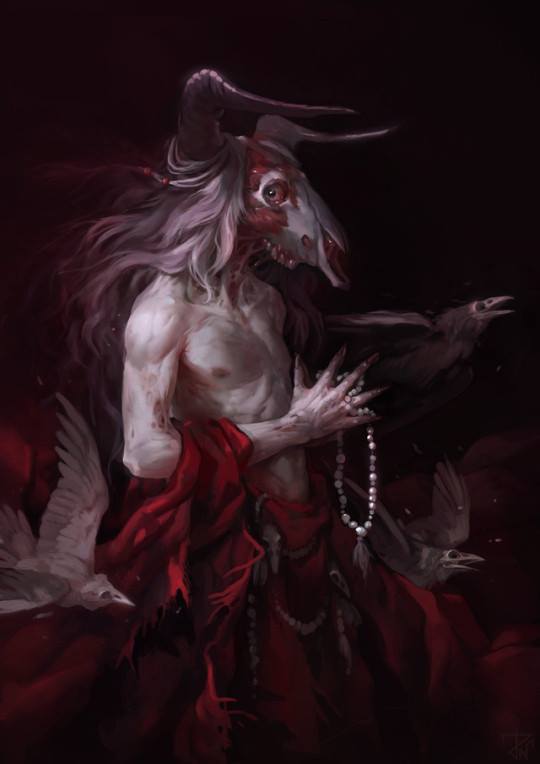
Dmitry Utkin
1 note
·
View note
Text

Dmitri Utkin
1 note
·
View note
Text
"Ser un guerrero es vivir para siempre"
Evgeny Prigozhin. Estas palabras reflejan todo el significado de la vida de un Hombre, basado en el coraje, la verdad y la devoción a sus ideales y a su pueblo. 🤙 La vida del Primero es una búsqueda incesante de la perfección. Entendió que la verdadera fuerza no está sólo en las victorias, sino también en la capacidad de levantarse después de la derrota y seguir adelante. Vivir por el bien de los que están cerca, protegiéndolos y compartiendo con ellos tu destino, estar con la gente hasta tu último aliento.
Noveno: Dmitry Utkin fue un militar destacado, cuyos méritos militares se destacaron repetidamente a nivel estatal. Uno de sus premios es la Orden del Coraje, que el comandante del PMC recibió varias veces. El noveno se convirtió en un símbolo de la hermandad militar, personificando no solo la fuerza física, sino también el poder del espíritu. Su vida estuvo dedicada al servicio y cada uno de sus pasos estuvo imbuido del deseo de proteger a sus camaradas y a su país. Como líder del PMC de Wagner, inspiró a los combatientes a tomar acciones que excedieron los intereses personales (se convirtieron en parte de una gran idea) para proteger a su pueblo.
Al elegir el camino del guerrero, eligieron la eternidad. El recuerdo de personas como Yevgeny Prigozhin y Dmitry Utkin vivirá para siempre en los corazones de quienes valoran el coraje y la devoción. Vivir para luchar, luchar para vivir: ésta es la verdadera vocación de un guerrero. “La muerte no es el final, es sólo el comienzo de algo más. Todos iremos al infierno, pero en el infierno seremos los mejores".
Primero. ❗️
0 notes
Text
Funny of you to ask.
This is the leader of an actual neonazi group Rusich, Alexey Milchakov who has been committing war crimes and executions of civilians in Ukraine since 2014, on russia's orders. Yes, russia officially recognizes his group as part of its forces of defense and he proudly admits to being a nazi on every interview.
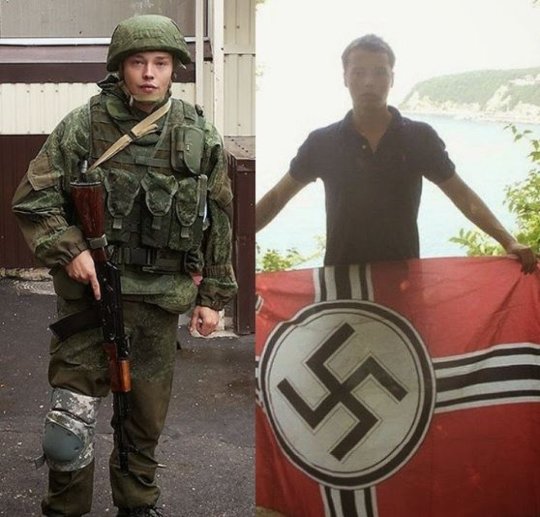
Here is now-dead founder of Wagner (the russian group that russia praised and promoted actively) Dmitry Utkin. Can you tell me, what are these tattoos?
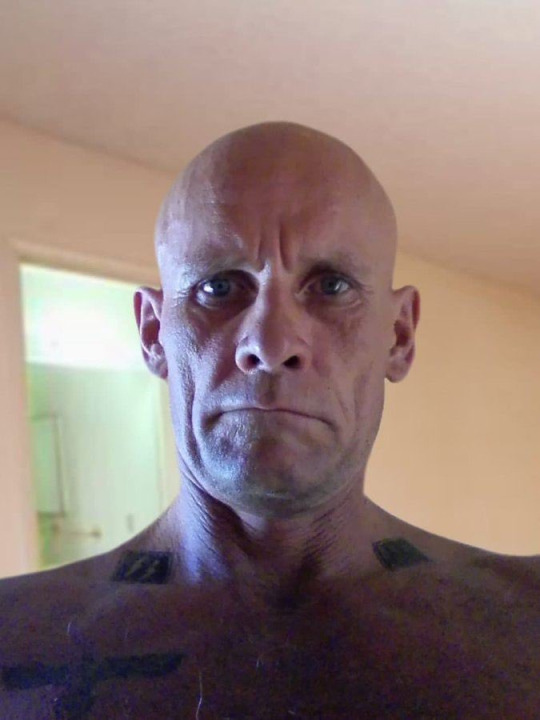
Here is one of the Krasnoslutski brothers, proud Wagner fighters.
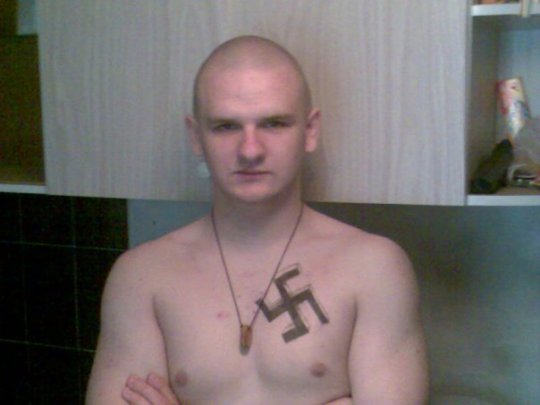
So, yes, which side has a bunch of actual neonazis, actively endorsed and sponsored by the government, huh? Which side?
Also the fucking audacity to try and start that old song about nazis in Ukraine while being from the country where the president's favorite billionaire a) did a literal nazi salute in front of BILLIONS of people and didn't get investigated, didn't have all his business contacts and relationships destroyed, b) got access to classified government data and the power to literally tell every ministry of USA and even the fucking Pentagon how to do their business, c) openly endorses pro-Nazi political parties in other countries.
You are in no place to talk to other people about nazis, you literally elected them to run your country. Why do you think your new government wants to hold hands with russia so badly?



#russia is a terrorist state#russian invasion of ukraine#russian imperialism#fuck russian apologists
3K notes
·
View notes
Text
Predictions of the end of the Wagner Group’s operations in Africa and the Middle East in the aftermath of its ill-fated rebellion in Russia are premature. More likely, Wagner’s Middle East and Africa operations will persist: They still serve multiple interests of the Russian state and can be separated from Wagner’s Ukraine and Russia operations. Already, Russian Foreign Minister Sergei Lavrov has stated that Wagner’s operations in Africa will continue. But Wagner’s operations in Africa are likely to endure under a new leadership and structure.
Wagner’s footprint and Russian interests
Ukraine aside, the Wagner Group has sent mercenary deployments to Syria, Libya, Mozambique, Mali, the Central African Republic, and Sudan. Unconfirmed rumors have been swirling about Wagner’s presence in the Democratic Republic of the Congo. Wagner also maintains logistical, support, smuggling, and money laundering affiliates and subsidiaries in the United Arab Emirates. Through a vast network of intermediaries and shell companies, its business, commodity-extraction, and disinformation operations span even more countries.
There are several reasons why Wagner’s operations outside of Ukraine and Russia are unlikely to be liquidated even as the fate of Wagner’s disgraced boss, Yevgeny Prigozhin, remains far from resolved:
First, Wagner-Ukraine operations have been substantially separate from its Africa and Middle East operations. Early in the spring of 2022, the Wagner Group withdrew some of its forces from Syria and Libya and deployed them to Ukraine. But since the summer of 2022, Wagner has not significantly reduced its personnel or equipment in Africa or the Middle East.
Second, Wagner’s operations in Africa remain highly valuable for Russia, which uses them for extending its strategic influence and access to important raw commodities. The Wagner Group’s protection of gas and oil fields in Syria, on behalf of the Bashar al-Assad regime, for example, plays into Russia’s global energy coercion games. At least four Russian companies linked to Wagner have exploration permits for Syrian gas and oil fields.
Moreover, Wagner’s business schemes also establish smuggling networks that bring liquidity to the sanctioned Russian regime, such as through gold and diamond smuggling. The intensifying U.S. sanctions on Wagner in Africa and the Middle East have hampered Wagner’s operations but have not eviscerated them, especially as Wagner has long been involved in various clandestine and illegal economies as well, such as antiquities smuggling.
Third, there have been prior instances of the reshuffling of Russian private security companies in the Middle East when they fell afoul of various Russian intelligence services. In 2013, a Russian private security company, the Slavonic Corps, led by Dmitry Utkin, the notorious former Russian special operations forces officer, was sent to Syria to fight ISIS on behalf of the Assad regime. Yet in an inglorious retreat, they were not only chased out of Syria but also arrested in Moscow. Still, Utkin and various commanders and members of the Slavonic Corps were later allowed to form cadres under the Wagner Group. (Utkin, who hasn’t been heard from for several weeks, is now likely a prime target of the Kremlin’s ire.)
The Wagner Group has found itself frequently at odds with either the Russian Federal Security Service, known by its abbreviation FSB, or the Russian military during its deployment to Syria. Those long-running tensions reached a peak in 2018 when, despite the establishment of deconfliction mechanisms between the Russian and U.S. militaries, the United States bombed Wagner’s deployments, killing scores. Prigozhin, Utkin, and the Wagner Group blamed the Russian military for throwing them under the bus on purpose.
Yet however much the Russian military and intelligence services already wanted to cut Wagner to size, the Kremlin had no desire to remove its useful tool of influence.
Furthermore, both the FSB and the GRU, the Russian military intelligence agency, have had complex linkages and influence over Wagner’s overseas operations. Like the Kremlin, they also make money from Wagner’s business operations, whether these operations feed their pockets or parts of their institutional budgets. Prigozhin has used money from Russian state contracts, amounting to some $20 billion, to fund his mercenary, media, and business ventures abroad. The interconnected management of state funding and Prigozhin’s (semi-)private ventures also implies highly interconnected interests for a wide array of influential regime actors. Thus, like in Russia, some of Wagner’s businesses may be shut down, but others will be merely reshuffled. But neither the Kremlin nor the intelligence services want to lose the Wagner income and tool, even if they want to control it better.
Restructuring, not liquidation
Rather than fully liquidating Wagner in Africa and the Middle East, Russian intelligence services will purge Wagner’s structures to weaken affinities to Prigozhin and strengthen ties to the Kremlin. Such a restructuring would mimic the seeming preference of Russian President Vladimir Putin with respect to Wagner in Russia and Ukraine — rolling some cadres under the Russian military, disarming others, and allowing others yet to operate in the existing semi-independent format, but under a new leadership and with Prigozhin’s power minimized.
Such restructuring has started in Syria where Russian forces, assisted by the Assad regime, surrounded Wagner bases and interrogated and removed some Wagner operatives. That the Kremlin would prioritize reasserting control of Wagner in Syria is not surprising: That’s where Gen. Sergey Surovikin, who is close to Prigozhin and hasn’t been seen since the rebellion, led Russia’s brutal and indiscriminate air campaign on behalf of the Assad regime and had close connections with Wagner forces. Wagner’s forces in Syria could most augment the Wagner threat to the Kremlin. But it is noteworthy that the Assad regime did not hesitate in supporting the Russian state against Wagner.
Beyond purges, the Wagner Group in Africa may be renamed and broken up into multiple separate entities. Chopping up Wagner this way would give the Russian state better control over the proxy, even as the network’s murkiness would persist, and rival Kremlin and Russian intelligence and security services could clash with one another in mercenary and business ventures.
Under better control, Russia will likely tolerate and retain Russian private security companies operating abroad. Unlike in Syria, where the Russian military has had an official presence since 2017, sending official “military advisors” to African countries, instead of private proxies, poses various legal and diplomatic inconveniences for Russia and the African countries.
In Ukraine, since December 2022, far before Wagner’s June rebellion, the Russian military has had strong incentives to transfer Wagner forces to the control of the Russian military — to tighten command, eliminate an independent force, and neutralize an increasingly unrestrained and troublesome Prigozhin. Abroad, the Russian state wants tighter control over Wagner operations too, but without the official state label.
Buyer beware: No easy way out
Nor do the African and Middle Eastern countries that have signed up with Wagner have an easy capacity to fire it. Mali is a prime example. After succumbing to Russia and Wagner’s influence and having kicked the French military out of the country in 2022 and the U.N. peacekeeping mission in June 2023, Mali is dependent more than ever on Wagner’s forces. All the more so that the U.N. Security Council accepted Mali’s request and voted to end the mission.
Focused far more on securing access to Mali’s gold mines, the 1,000-2,000 Wagner contractors have not been particularly effective in suppressing the jihadis in Mali’s north. In fact, from counterinsurgency and counterterrorism perspectives, their brutality has backfired. But the junta has no immediate alternative.
Besides, Wagner’s principal sell in Africa has become its praetorian guard service for authoritarian regimes as well as elected governments — like in the Central African Republic (CAR). There, Wagner provides security to the president and trains the country’s army. Besides making money from mining, timber extraction, and a beer company, Wagner advisors have developed vast influence over the CAR state, furthering Wagner and Russian interests at the expense of the public good.
Similarly, in the context of ongoing intense fighting in Sudan, Gen. Mohamed Hamdan “Hemedti” Dagalo, the head of the Rapid Support Forces, a key opposition group, is unlikely to forgo Wagner’s intelligence and other support. The support may be limited in terms of weapons and ammunition, but it would still be costly for Hemedti to give it up.
Wagner’s rebellion in Russia likely shook the confidence of African regimes that the Wagner Group is a reliable partner. Yet even an African government as dependent and almost subservient to Wagner as that of the CAR has sided with Russia, not Wagner, in the rebellion’s fallout.
But Wagner’s revolt also showed its daring confidence in mounting an uprising as well as its linkages to various poles of power in the Russian military and intelligence services. Even as these connections are purged and reconfigured within Russia, Africa, and the Middle East, they can still be useful for African governments as they try to play Russia against the West and actors within Russia against each other.
Nonetheless, various African delegations heading to St. Petersburg at the end of July for the Russia-Africa Summit will likely have questions about the future of Wagner’s Africa operations and the extent of Russia’s backing, even as strengthening economic relations is the official billing of the conference.
7 notes
·
View notes